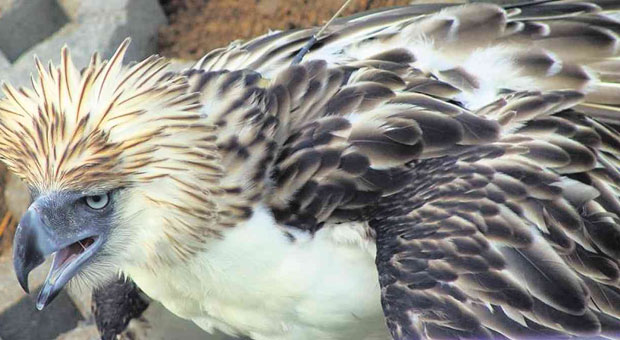New lead on Pamana killing pursued

NATIONAL TREASURE Pamana, a 3-year-old juvenile Philippine Eagle, died from a bullet wound on the chest two months after she was released into the wild on June 12.
AUTHORITIES are following a new lead in the killing of Philippine eagle Pamana, who was shot dead two months after being released into the wild, according to Dennis Salvador, executive director of the Philippine Eagle Foundation.
Pamana was set free at Mount Hamiguitan Range Wildlife Sanctuary in Barangay La Union in San Isidro town in Davao Oriental province. It is a protected area.
Salvador declined to provide details on the new lead, which he said, seems to be “more substantive.” But he told reporters at the Senate that it is hoped that the new information would lead to the capture of the perpetrators.
The provincial police in Davao Region have taken over from local authorities the handling of the investigation of the incident.
A P500,000 reward is being offered to whoever will be able to provide information that will pinpoint those responsible for Pamana’s killing, according to Director Theresa Mundita Lim of the Biodiversity Management Bureau.
Article continues after this advertisementBut aside from capturing the people who shot Pamana dead, Salvador said, it is important that the full force of the law be brought down on the perpetrators.
Article continues after this advertisementThe Wildlife Resources Conservation and Protection Act prescribes a fine of P100,000 to P1 million, and/or a jail term of six to 12 years.
“Hopefully, with the public attention that Pamana is getting, this will lead to effective prosecution and enforcement of the law. Hopefully, this will become a benchmark for dealing with wildlife offenses, not just for the Philippine eagle, but for other critically endangered species as well,” Salvador told reporters.
He noted that in previous instances, people who were prosecuted for harming endangered species, such as the Philippine eagle, received the equivalent of a slap on the wrist.
In one case, the judge ordered the perpetrator to pay a P100,000 fine. When the man was unable to produce the amount, he was instead sentenced to six months in jail.
“The government just has to show political will in enforcing its laws. Why do we have these laws if we can’t enforce these?” Salvador said.
At the same time, he said, there is a need to engage the communities to help in the protection of endangered species, and for the government to spend to protect the country’s natural resources.
“These resources have to be thought of as capital not only for present use, but [for] the use of our children and children’s children,” he added.
Sen. Francis Escudero, chair of the Senate committee on environment and natural resources, agreed that there was a need for the government to allocate more resources for the conservation of the country’s natural resources.
The additional funds could be used to hire more forest guards. At present, Escudero noted, there is only one forest guard for every 7,000 hectares.
He also suggested that the administration’s conditional cash transfer program be extended to programs to protect the environment.
Families living in forested areas could be tapped to help protect endangered species and conserve resources in exchange for the cash assistance.
At present, the conditional cash transfer program administered by the Department of Social Welfare and Development is used to ensure that children from the poorest of the poor families go to school and that pregnant women undergo regular checkups.